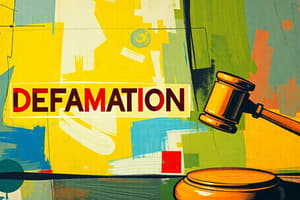Podcast
Questions and Answers
What is the difference between libel and slander?
What is the difference between libel and slander?
Libel is defamation in writing or some other permanent form, while slander is spoken defamation or defamatory language in some other temporary form.
Who has the burden of proof in a defamation case?
Who has the burden of proof in a defamation case?
The burden of proof for establishing the truth of the statement or any other defense is on the defendant.
What should writers and broadcasters consider before publishing a statement?
What should writers and broadcasters consider before publishing a statement?
Writers and broadcasters should determine when statements can be published with a reasonable degree of safety. Considerations include whether the piece is true, can be proved to be true, or is covered by other defenses to defamation.
Flashcards
Libel
Libel
A false statement that harms someone's reputation in writing or a permanent form.
Slander
Slander
A false statement that harms someone's reputation spoken aloud or in a temporary form.
Burden of Proof in Defamation
Burden of Proof in Defamation
The defendant in a defamation case must prove the truth of their statement, or a valid defense.
Study Notes
- Defamation refers to a false statement published to a third party that harms the claimant's reputation.
- The burden of proof for establishing the truth of the statement or any other defense is on the defendant.
- Defamation actions are heard by a judge and jury, and legal aid is not available.
- Libel is defamation in writing or some other permanent form, while slander is spoken defamation or defamatory language in some other temporary form.
- Damage is presumed in cases of libel, but in cases of slander, the claimant has to prove actual loss.
- The distinction between libel and slander is relevant only to the issue of damages.
- Writers and broadcasters should determine when statements can be published with a reasonable degree of safety.
- Considerations include whether the piece is true, can be proved to be true, or is covered by other defenses to defamation.
- The subject of the piece may sue if the statement tends to lower them in the estimation of right-thinking members of society generally.
- The investigative journalist is particularly exposed to the risk of making a slanderous statement.
Studying That Suits You
Use AI to generate personalized quizzes and flashcards to suit your learning preferences.




